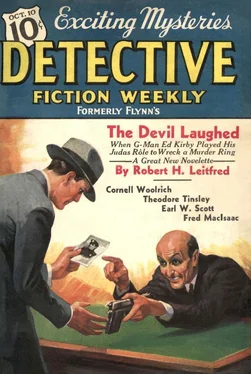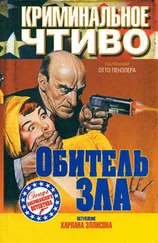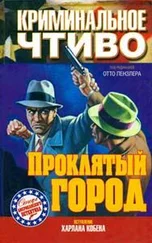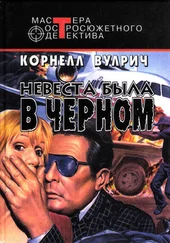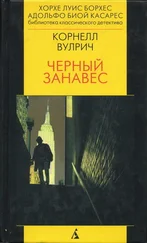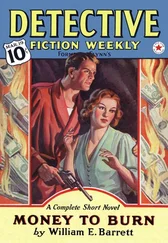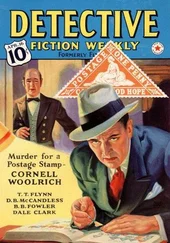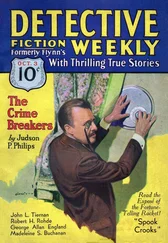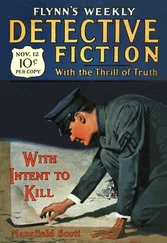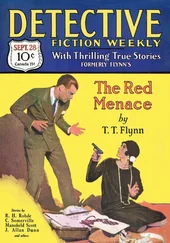Корнелл Вулрич - Detective Fiction Weekly. Vol. 50, No. 5, October 10, 1936
Здесь есть возможность читать онлайн «Корнелл Вулрич - Detective Fiction Weekly. Vol. 50, No. 5, October 10, 1936» весь текст электронной книги совершенно бесплатно (целиком полную версию без сокращений). В некоторых случаях можно слушать аудио, скачать через торрент в формате fb2 и присутствует краткое содержание. Город: New York, Год выпуска: 1936, Издательство: The Red Star News Company, Жанр: Детектив, на английском языке. Описание произведения, (предисловие) а так же отзывы посетителей доступны на портале библиотеки ЛибКат.
- Название:Detective Fiction Weekly. Vol. 50, No. 5, October 10, 1936
- Автор:
- Издательство:The Red Star News Company
- Жанр:
- Год:1936
- Город:New York
- ISBN:нет данных
- Рейтинг книги:4 / 5. Голосов: 1
-
Избранное:Добавить в избранное
- Отзывы:
-
Ваша оценка:
- 80
- 1
- 2
- 3
- 4
- 5
Detective Fiction Weekly. Vol. 50, No. 5, October 10, 1936: краткое содержание, описание и аннотация
Предлагаем к чтению аннотацию, описание, краткое содержание или предисловие (зависит от того, что написал сам автор книги «Detective Fiction Weekly. Vol. 50, No. 5, October 10, 1936»). Если вы не нашли необходимую информацию о книге — напишите в комментариях, мы постараемся отыскать её.
Detective Fiction Weekly. Vol. 50, No. 5, October 10, 1936 — читать онлайн бесплатно полную книгу (весь текст) целиком
Ниже представлен текст книги, разбитый по страницам. Система сохранения места последней прочитанной страницы, позволяет с удобством читать онлайн бесплатно книгу «Detective Fiction Weekly. Vol. 50, No. 5, October 10, 1936», без необходимости каждый раз заново искать на чём Вы остановились. Поставьте закладку, и сможете в любой момент перейти на страницу, на которой закончили чтение.
Интервал:
Закладка:
The motorman said from the other side of him, “Get him off. We can’t stand here all night. We’re on a schedule; we’ll tie up the whole line into a knot behind us.”
“Stand aside! Who do you think you are anyway?” the fiery conductor demanded.
Step said wearily, “Oh, do I have to go through that again?” and absent-mindedly palmed his badge to him, backhand, while he continued bending over the prostrate form. From then on there was nothing but a respectful silence all around while he went on going through the corpse’s pockets with maddening deliberation.
His mind, however, was anything but sluggish, was crackling like a high-tension wire. The sound of the shot? There didn’t necessarily have to be any in this case, but that crack of the car-wheels over a split in the rails had probably been it. And the match that one of those two tipsy dancers had struck in the darkened tenement-room back there hadn’t been a match at all, hadn’t glowed steadily enough nor lasted long enough, couldn’t have been anything but the flash of the shot, the results of which he was now beholding.
Drinking, carousing, then entertaining themselves by taking pot-shots out the window at passing trains, were they? Well, a nice little manslaughter rap would take the high spirits out of them, for some time to come, whoever they were.
“Dudley Wall,” he said, reading from an envelope. “Lives on Staten Island like me. Shame, poor fella. All right, take him by the feet and help me get him outside to the waiting-room.” And as the conductor moved backwards before him down the aisle, with the body between them, he rebuked: “ Don’t walk so fast. He ain’t going to get away from us!” They moved at a snail’s pace thereafter, to suit Step, out through the gate and across the platform with their burden. Stretched him out on one of the benches inside by the change-booth, and then Step strolled inside, with the agent and sent in his report over the latter’s phone.
“That guy,” whispered the conductor darkly to the motorman on their way back to their posts, “has sleeping sickness, you can’t tell me different!”
“Maybe it’s ringworm,” hazarded the motorman. They pulled out, and the two or three other trains that had ganged up behind them flashed by one after the other without stopping, to make up for lost time.
“I gotta get back to Desbrosses Street,” Step remarked, coming out again. “You keep an eye on him till they get here.” He felt sure he’d know the tenement window again when he saw it, whether they were still there or not.
“Well, you’ll have to go down to the street, cross over, and then climb to the uptown side,” the agent explained, wondering what he was waiting for.
Step looked horrified. “And then when I get there climb down again? And climb up four flights of stairs inside that building? Oh, golly, I’m just tuckered out. I couldn’t make it. I’ll walk back along the track, only way I can see. That’s bad enough.”
He sighed deeply, took a tuck in his belt, and made his way to the far end of the platform. He descended the short ladder to the track-level and struck out from there, trudging doggedly along with one hand trailing along beside him on the guard-rail.
“Watch the trains!” the agent shouted after him warningly.
Step didn’t answer out loud, that was too much trouble, but to himself he muttered: “This is one time I’m glad I’m good and thin!”
One of them caught him halfway between the two stations, and the sight of it looming up on him was fairly terrifying to one unused to track-walking. He began to wobble unsteadily on the cat-walk, which seemed only inches wide, and realizing that he would either topple dizzily in front of it or fall down to the street if he kept looking at it head-on, he wisely turned his back to it, grabbed the guard-rail with both hands, and stared intently out at the roof-tops, ignoring it till it had hurtled by. Its velocity nearly seemed to pull the coat off his back.
He stared after it disapprovingly. “Such a town. Everything always in a hurry to get somewhere else!” Then he resumed his laborious progress alongside the tracks, feeling sorry for his feet and hoping the sniper in the tenement had no firearms license, so he could also tack a stiff Sullivan-Law charge on him.
The two lighted halves of the Desbrosses Street platform loomed toward him, lighted under the apron like the footlights of a stage. It ought to be about here. They’d already pulled out, he remembered, when he’d turned around to look. Dark-red brick it had been, but then the whole row was that. No fire-escape, either. Wait a minute, there’d been a sign up on the cornice of the building next-door, but on which side of it, he couldn’t recall. Nor what it had said, until suddenly it was staring him in the face once more, with that vague familiarity that only twice-seen things can have. Then he knew that was it. PICKLED AND SALTED FISH in tarnished metal capitals with rain-streaks under them, each letter separately clamped to the brickwork, in the style of the nineteenth-century advertiser. He stopped in front of the building next to it, on the Desbrosses side. This had almost certainly been it There was the same wide-open window through which he’d seen them dancing. But no light was coming in from the other room now. It was dark and deserted, just a gap in the façade.
It looked near enough to touch, but actually was far more inaccessible from where he now was, than it had seemed from the train-window. The gap was just wide enough to fall to your death in without half-trying, and the ledge was just over his head, now that he was down at track-level.
Step Lively had the courage of his convictions. He was going to get in this way, without going all the way down to the street and climbing up inside that dump, if he died in the attempt. He looked around him vaguely but determinedly. They had been repairing the track-bed near here somewhere, and there was a neat, handy little stack of short planks piled up, almost directly across the way from him — but with two third-rails in-between.
He didn’t hesitate for a minute. What was a third rail compared to climbing four flights of stairs and getting all out of breath? Besides, they had guards on top of them, like covered troughs. There wasn’t anything coming on this side, so he started across on one of the ties, and arched respectfully over the deadly metal when he came to it. So much for the downtown track. An uptown train was pulling out of Franklin, but it wouldn’t get here for awhile yet. Plenty of time to get back and across.
He reached the opposite catwalk safely, picked up the top plank, and tucked it broadside under his arm. The on-coming train was still at a respectable distance, although its lights were getting brighter by the moment. He started back over, the plank swaying up and down in his grasp like a seesaw. It wasn’t the actual weight of it that hampered him, it was that its length threw him off-balance. He was like a tightrope-walker with too long a pole. He didn’t have it right in the middle, and it kept tipping him forward. The train was big as a barn by now, he hadn’t calculated on how quickly it would cover the short distance between the two stations. You could already look right down the lighted aisle of the first car, through the open vestibule-door. But this was no time for surveying. He lifted one foot clear of the contact-rail, set it down on the other side, then tried to bring the second one over after it. It wouldn’t come. He must have given it just the wrong kind of a little half-turn. It was stuck between the two ties.
He didn’t do anything at all for just a split second, which is sometimes the wisest possible course — and came easiest to him, anyway. However, there weren’t many of them left, split or otherwise. The roar of the train was rising to a crescendo. The first thing almost anyone else would have done in his fix would have been to yank and tug at the recalcitrant foot — and wedge it in irretrievably. Step Lively was a slow mover but a quick thinker. He used his split-second to turn his head and stare down one hip at the treacherous hoof. The heel had dipped down into the space between the two ties and jammed. It ought to come out again easy enough, if he did the right thing. And there wasn’t time to do the wrong thing. So he started turning back again on it, as if he were going to step right in front of the train. That reversed whatever twist had originally trapped it; it came up free, smooth as pie, and he stepped backwards with it out of death’s path, face turned toward the train as it rushed abreast of him, brakes that wouldn’t have been in time to save him screeching. He had presence of mind enough to point the plank skyward, like a soldier presenting arms, so the train wouldn’t sideswipe it and throw him. The cars seemed to take the skin off his nose.
Читать дальшеИнтервал:
Закладка:
Похожие книги на «Detective Fiction Weekly. Vol. 50, No. 5, October 10, 1936»
Представляем Вашему вниманию похожие книги на «Detective Fiction Weekly. Vol. 50, No. 5, October 10, 1936» списком для выбора. Мы отобрали схожую по названию и смыслу литературу в надежде предоставить читателям больше вариантов отыскать новые, интересные, ещё непрочитанные произведения.
Обсуждение, отзывы о книге «Detective Fiction Weekly. Vol. 50, No. 5, October 10, 1936» и просто собственные мнения читателей. Оставьте ваши комментарии, напишите, что Вы думаете о произведении, его смысле или главных героях. Укажите что конкретно понравилось, а что нет, и почему Вы так считаете.
